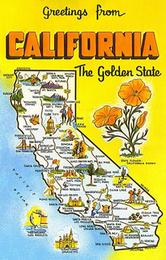 Strong reaction continues to Amazon's sales tax defeat in the California legislature last week (Shelf Awareness, June 30, 2011). In the San Francisco Chronicle, Andrew S. Ross reported that Amazon appeared to be ignoring the sales tax collection requirement for online retailers, which is now in effect: "So, I went online Friday looking to buy a copy of John Kenneth Galbraith's The Affluent Society & Other Writings, 1952-1967.... Barnes & Noble's website was selling it for $26.53. Total, which included California sales tax: $28.79. 'Total Before Tax' at Amazon.com: $26.40. 'Estimated Tax To Be Collected: $0.00'.... In other words, screw you, California, and your laws."
Strong reaction continues to Amazon's sales tax defeat in the California legislature last week (Shelf Awareness, June 30, 2011). In the San Francisco Chronicle, Andrew S. Ross reported that Amazon appeared to be ignoring the sales tax collection requirement for online retailers, which is now in effect: "So, I went online Friday looking to buy a copy of John Kenneth Galbraith's The Affluent Society & Other Writings, 1952-1967.... Barnes & Noble's website was selling it for $26.53. Total, which included California sales tax: $28.79. 'Total Before Tax' at Amazon.com: $26.40. 'Estimated Tax To Be Collected: $0.00'.... In other words, screw you, California, and your laws."
"They're not intending to comply, by all indications," said Betty Yee, former chairwoman and current member of the state Board of Equalization. "So, we'll bill them at the end of this quarter, based on estimates either they provide or we come up from other data sources. Then, if they don't come forward and pay, we'll consider other courses of action."
Bill Dombrowski, president of the California Retailers Association, added: "Seeing what's going on across the country, they want to stall. We know we're going to be litigating it."
The Los Angeles Times noted that a showdown between Amazon and the state could be months away: "Companies don't send the taxes to the state until the end of each quarter, which means the California Board of Equalization won't know officially about Amazon's refusal to collect them until October 1.... Such defiance sets up a major legal battle by this fall, though Amazon could first challenge the law in court, as it has in New York. It has lost a trial court ruling there and has an appeal pending."
Mary Williams, events manager at Skylight Books, Los Angeles, weighed in on the issue in the bookshop's July e-newsletter to customers: "It's a thorny issue, but here's my take: For Skylight, for your other favorite small businesses, for the continuation of the public services you use, and even for the chain stores you shop in, this is great news and a hard-won victory. Because our state needs to get all the money it's owed, for better schools and roads and libraries. And collecting sales tax online and in the store isn't too onerous for us, a small business, so it can't be that crushingly big of a deal to these giant online-only retailers. Unless it's the unevenness of the playing field that they're fighting so hard for--the right to a de facto discount that only their narrow class of businesses is allowed to give. And isn't it wrong to let our state be bullied out of its metaphorical lunch money for something like that? I think it is, and I'm proud of California for standing up to these tactics and demanding that the playing field be shifted back into level." Barnes & Noble CEO William Lynch issued a statement expressing appreciation for the ruling: "We thank Governor Jerry Brown for demonstrating his commitment to California businesses by signing e-fairness into law. This legislation will directly benefit California businesses by creating a fair marketplace. We believe that e-fairness will improve the economy, add jobs, and help struggling businesses everywhere in California. By signing this law, the Governor has made clear that his priorities are to help bolster economic recovery. This is a huge win for business in the state of California."
Barnes & Noble CEO William Lynch issued a statement expressing appreciation for the ruling: "We thank Governor Jerry Brown for demonstrating his commitment to California businesses by signing e-fairness into law. This legislation will directly benefit California businesses by creating a fair marketplace. We believe that e-fairness will improve the economy, add jobs, and help struggling businesses everywhere in California. By signing this law, the Governor has made clear that his priorities are to help bolster economic recovery. This is a huge win for business in the state of California."
Bookshop Santa Cruz "has offered to pick up the California online sellers that Amazon has dropped and pay them a 5% commission for books they sell on their websites. In a letter to customers, the shop called Gov. Jerry  Brown's new state budget and its tax on online sellers 'a hard-fought victory for local bricks and mortar bookstores, pharmacies, shoe stores, bike shops and other local retailers,' " the Santa Cruz Patch reported.
Brown's new state budget and its tax on online sellers 'a hard-fought victory for local bricks and mortar bookstores, pharmacies, shoe stores, bike shops and other local retailers,' " the Santa Cruz Patch reported.
"We feel like we didn't want it to be self-serving," owner Casey Coonerty Protti said. "But there are people out there going what am I going to do now? We wanted to help them out. We've always had an affiliate program. It's been there, but because Amazon has resources and technological prowess to make it super-easy for people, I think people went the super-easy route. We've always had it and want to fight this battle. If you want to raise funds for schools and these things, why not go with your local book store?"
Geekwire offered a "guide to why Amazon is losing the tax battle," noting that Amazon "has put no human face on its efforts. They’ve completely missed the opportunity to highlight hundreds of small entrepreneurs, bloggers and business owners who earn revenue from Amazon links. They could use these people as examples of who will be hurt in this fight.... The tax issue will either resolve itself in the form of a national movement like the Streamlined Sales Tax Project. Or, certain states will start to position themselves as 'Internet-friendly' tax havens. But regardless of what happens with the tax, Amazon has squandered so much and gained so little in return."

